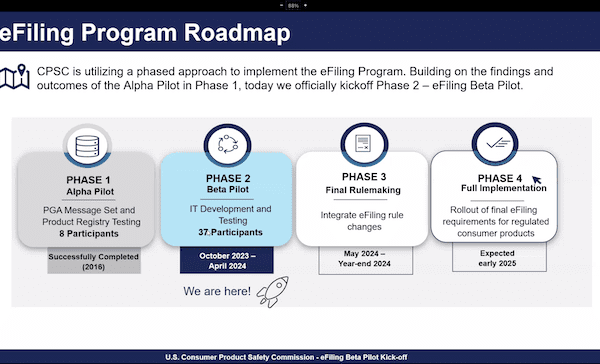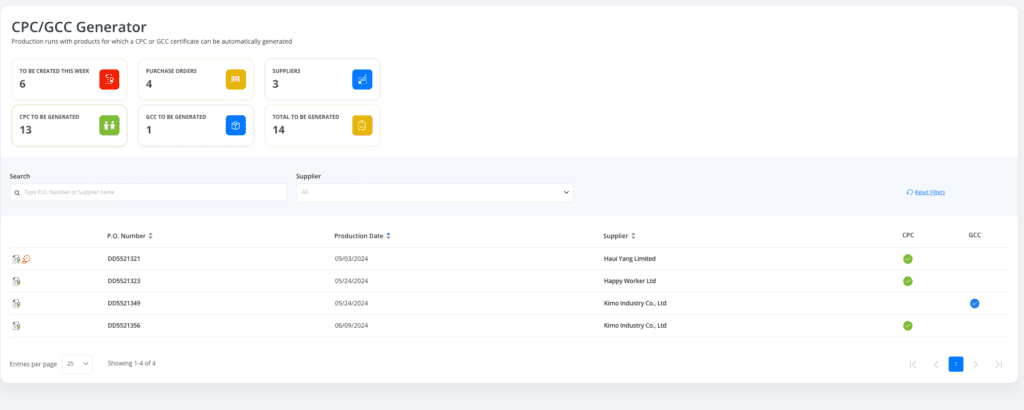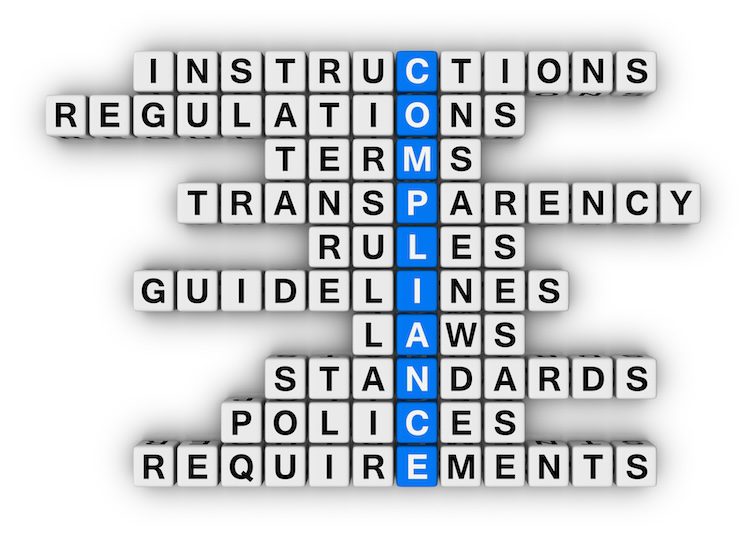
by Bill Jacoby | Dec 8, 2023 | Insights
AGENCY:
Consumer Product Safety Commission.
ACTION:
Supplemental notice of proposed rulemaking.
SUMMARY:
The U.S. Consumer Product Safety Commission (Commission or CPSC) is issuing a supplemental notice of proposed rulemaking (SNPR) to revise the agency’s rule for Certificates of Compliance (certificates). The SNPR proposes to align the certificate rule with other CPSC rules on testing and certification, and to implement, for imported CPSC-regulated products and substances, electronic filing of certificates (eFiling) with U.S. Customs and Border Protection (CBP).
DATES:
Submit comments by February 6, 2024.
ADDRESSES:
Comments related to the Paperwork Reduction Act (PRA) aspects of the proposed rule should be directed to the Office of Information and Regulatory Affairs, the Office of Management and Budget, Attn: CPSC Desk Officer, FAX: 202–395–6974, or emailed to oira_submission@omb.eop.gov.
You may submit all other comments, identified by Docket No. CPSC–2013–0017, by any of the following methods:
Electronic Submissions: Submit electronic comments to the Federal eRulemaking Portal at: https://www.regulations.gov.Follow the instructions for submitting comments. CPSC typically does not accept comments submitted by email, except as described below. CPSC encourages you to submit electronic comments by using the Federal eRulemaking Portal.
Mail/Hand Delivery/Courier/Confidential Written Submissions: Submit comments by mail, hand delivery, or courier to: Office of the Secretary, Consumer Product Safety Commission, 4330 East West Highway, Bethesda, MD 20814; telephone: (301) 504–7479. If you wish to submit confidential business information, trade secret information, or other sensitive or protected information that you do not want to be available to the public, you may submit such comments by mail, hand delivery, or courier, or you may email them to: cpsc-os@cpsc.gov.
Instructions: All submissions must include the agency name and docket number. CPSC may post all comments without change, including any personal identifiers, contact information, or other personal information provided, to: https://www.regulations.gov. Do not submit through this website: confidential business information, trade secret information, or other sensitive or protected information that you do not want to be available to the public. If you wish to submit such information, please submit it according to the instructions for mail/hand delivery/courier/confidential written submissions.
Docket: For access to the docket to read background documents or comments received, go to: https://www.regulations.gov, and insert the docket number, CPSC–2013–0017, into the “Search” box, and follow the prompts.
FOR FURTHER INFORMATION CONTACT:
Arthur Laciak, Project Manager, eFiling Program Specialist, Office of Import Surveillance, Consumer Product Safety Commission, 4330 East West Highway, Bethesda, MD 20814; (301) 504–7516, or by email to: alaciak@cpsc.gov.
SUPPLEMENTARY INFORMATION:
The Commission proposes to revise the rule for certificates, codified at 16 CFR part 1110 (part 1110 or the 1110 rule) to clarify certificate requirements for all regulated products and substances, to align the rule with other testing rules, and to implement electronic filing of certificates for imported products with CBP (eFiling).[1] Only finished products or substances that are subject to a CPSC rule, ban, standard, or regulation, are required to be tested and certified, and only such finished products that are imported into the United States for consumption or warehousing would be required to eFile certificates with CBP. Section 14(g)(4) of the Consumer Product Safety Act (CPSA) (15 U.S.C. 2063(g)(4)) gives CPSC the authority to require eFiling, by rule.[2]
The Commission established part 1110 to implement sections 14(a) and (g) of the CPSA (15 U.S.C. 2063(a) and (g)), which provide requirements for the content, form, and availability of certificates. After passage of the Consumer Product Safety Improvement Act of 2008 (CPSIA), which amended section 14 of the CPSA to add testing and certification requirements for CPSC-regulated consumer products and substances, the Commission sought to bring clarity and reduce burden to stakeholders through part 1110, by, among other things, limiting the parties required to issue certificates and allowing electronic certificates (available through email or a worldwide web link) to “accompany” product shipments instead of paper certificates. 73 FR 68328 (Nov. 18, 2008).
After gaining experience with certificates in 2013, the Commission issued a notice of proposed rulemaking (NPR) to revise part 1110 to align with rules for testing children’s products under 16 CFR part 1107 (part 1107 or the 1107 rule) and component part testing under 16 CFR part 1109 (part 1109 or the 1109 rule), and to require eFiling of certificates for imported consumer products with CBP at the time of filing the CBP entry, or the time of filing the entry and entry summary, if both are filed together. 15 U.S.C. 2063(g)(4)); 78 FR 28080 (May 13, 2013) (2013 NPR).[3] As described in section II.D of this preamble, since 2013 the Commission has undertaken a series of projects to support an eFiling program. Building on the 2013 NPR, this SNPR proposes to amend part 1110 to, among other things: revise terminology to integrate concepts introduced in the 1107 and 1109 rules; broaden the definition of “importer” to address commenters’ concerns about the product certifier having control over and knowledge of the goods; allow private labelers to test and certify products; and implement eFiling for imported, CPSC-regulated consumer products and substances.
I. Statutory Authority
Section 102 of the CPSIA amended section 14(a) of the CPSA to require that manufacturers (including importers) and private labelers issue certificates for all consumer products subject to a consumer product safety rule under the CPSA, or a similar rule, ban, standard, or regulation under any other law enforced by the Commission, that are imported for consumption or warehousing, or distributed in commerce. 15 U.S.C. 2052(a)(11) and 2063(a)(1). Certificates for children’s products (Children’s Product Certificates or CPCs) must be based on testing performed by a third party conformity assessment body whose accreditation to perform such testing has been accepted by the Commission. 15 U.S.C. 2063(a)(2). Certificates for non-children’s products (General Certificates of Conformity or GCCs) must be based on a test of each product or a reasonable testing program. 15 U.S.C. 2063(a)(1)(A). Section 14(a)(1)(B) of the CPSA requires that certificates specify each rule, ban, standard, or regulation applicable to the product. 15 U.S.C. 2063(a)(1)(B).
Section 14(g) of the CPSA contains additional requirements for the form, content, and availability of certificates. 15 U.S.C. 2063(g). Section 14(g)(1) of the CPSA requires that each certificate identify the manufacturer (including importer) or private labeler issuing the certificate, as well as any third party conformity assessment body on whose testing the certificate depends. 15 U.S.C. 2063(g)(1). At a minimum, certificates must include the date and place of manufacture; the date and place where the product was tested; each party’s name, full mailing address, and telephone number; and contact information for the individual responsible for maintaining records of test results. Id. Section 14(g)(2) of the CPSA requires that every certificate be legible and that all contents be in English; contents can additionally be in another language. 15 U.S.C. 2063(g)(2).
Certificates must accompany the applicable product or shipment of products covered by the certificate, and a copy of the certificate must be furnished to each distributor or retailer of the product. Upon request, the manufacturer (including importer) or private labeler issuing the certificate must provide a copy of the certificate to the Commission. 15 U.S.C. 2063(g)(3). Finally, section 14(g)(4) of the CPSA states that in consultation with the Commissioner of Customs, CPSC may, by rule, provide for the electronic filing of certificates up to 24 hours before arrival of an imported product. Upon request, the manufacturer (including importer) or private labeler issuing the certificate must provide a copy of such certificate to the Commission and to CBP. 15 U.S.C. 2063(g)(4).
In addition to the statutory authority to require certificates for regulated products and substances, as outlined in sections 14(a) and (g) of the CPSA, the Commission has general authority with regard to certificates pursuant to section 3 of the CPSIA, which provides that “the Commission may issue regulations, as necessary, to implement this Act and the amendments made by this Act.” Notes to 15 U.S.C. 2051 (citing Pub. L. 110–314, 3, Aug. 14, 2008, 122 Stat. 3017).
II. Background: Certificates and eFiling
A. The 1110 Rule
As noted, the CPSIA expanded section 14 of the CPSA to require testing and certification of consumer products subject to a consumer product safety rule, or to a similar rule, ban, standard, or regulation under any other act enforced by the Commission. 15 U.S.C. 2063(a)(1). When the Commission initially issued the 1110 rule to implement this requirement, it adopted an approach that was “streamlined, at least in its initial phase.” 73 FR 68328 (Nov. 18, 2008). The rule designated the importer as the sole entity responsible for issuing certificates for imported consumer products, stating that to “accompany” a product or product shipment, the certificate must be available to the Commission no later than the time when the product or shipment is available for inspection in the United States. Id. The rule designated domestic manufacturers as the sole entity responsible for issuing certificates for domestically manufactured products, stating that such certificates must be available to the Commission upon request before the product or shipment is introduced into domestic commerce. Id.
The rule provided that the requirements in section 14(g)(1) and (3) of the CPSA that a certificate “accompany” a product or product shipment, be furnished to retailers and distributors, and be provided to CPSC upon request, could be satisfied by providing the statutorily required certificate information by electronic means. The rule explained that the certificate must be reasonably accessed by information on the product or accompanying the product or shipment, for example, a unique identifier that can be accessed via a Uniform Resource Locator (URL) or other electronic means. 73 FR 68330–31. In practice, many importers and manufacturers email certificates to CPSC in PDF format, when requested. The existing 1110 rule did not implement the authority in section 14(g)(4) of the CPSA to have certificates for imported products be eFiled with CBP. 15 U.S.C. 2063(g)(4).
The 2008 rule was not expected to be permanent. Instead, the Commission explained at the time that it “expects that with time CPSIA’s expanded certification requirements will become more routine and it then would consider whether this rule needs to be revised based on actual experience.” 73 FR 68328.
B. The 2013 Notice of Proposed Rulemaking
By 2012, CPSC staff had worked to refine the Risk Assessment Methodology (RAM) required by section 222 of the CPSIA, and had begun to grapple with the rise of internet-based companies selling consumer products (eCommerce) and direct-to-consumer shipments, which made CPSC’s interdiction of non-compliant products more challenging. To address those concerns, and to be able to use certificate data for targeting and enforcement of CPSC’s rules at the ports, CPSC proposed in the 2013 NPR to implement eFiling of certificates with CBP for regulated, imported products, pursuant to section 14(g)(4) of the CPSA.
The 2013 NPR also sought to revise part 1110 to integrate the rule into the testing and certification regime contemplated in then-new parts 1107 and 1109. The 1107 rule sets forth requirements for children’s product testing and certification, including when and how products must be tested and certified, and recordkeeping requirements. The 1109 rule sets forth conditions and requirements for component part testing and certification for both children’s and non-children’s products. Both rules introduced new concepts and terminology related to certificates that are not present in the 1110 rule of 2008.
CPSC received over 500 comments from more than 70 commenters, as summarized in section III of this preamble, many asserting that implementation of the proposed eFiling requirement was infeasible and unreasonable due to the lack of information technology (IT) infrastructure for CBP to accept such data. At that time, CBP had not yet completed its Automated Commercial Environment (ACE) interface nor the Partner Government Agency (PGA) Message Set, which now enable importers or their brokers to submit electronic import data. For its part, CPSC had not yet fully implemented the RAM.
Since publication of the 2013 NPR, CPSC has implemented RAM 2.0 and CBP has implemented ACE and developed the PGA Message Set.[4] In 2016 and 2017, CPSC conducted an eFiling Alpha Pilot, in coordination with CBP, involving eight volunteer participants who successfully eFiled a limited set of targeting/enforcement data for regulated products. Also, in 2017, CPSC conducted a Certificate Study to assess CPCS’s ability to use certificates and the information on them for risk assessment and targeting of regulated, imported consumer products. In December 2020, the Commission approved of a multi-year plan to implement an eFiling program at CPSC.[5] The next steps in this eFiling plan include the ongoing eFiling Beta Pilot, which is scheduled to begin accepting data in the fall of 2023, and developing this SNPR.[6]
C. CPSC’s Risk Assessment and Targeting Efforts for Imported Consumer Products
CPSC’s RAM currently receives an electronic feed of import entry data collected by CBP. The RAM is optimized to ingest CBP’s data, using algorithms to identify potentially noncompliant consumer product shipments for CPSC’s inspection. However, the data ingested by RAM are collected by CBP for its enforcement and tariff purposes, which do not always align with CPSC’s risk assessment purposes. CPSC’s Certificate Study confirmed that CPSC can analyze certificate data focused specifically on product manufacturing and testing to improve RAM’s precision in targeting and identifying high-risk shipments for examination.
Currently, CPSC’s import enforcement methodology is labor-intensive and lacks an efficient means of using product-specific data to identify potentially non-compliant products. CPSC co-locates staff alongside CBP staff at ports of entry to target shipments for examination. Once identified, staff request that CBP place a shipment on hold and transport it to an examination station for CPSC inspection; an examination hold creates delay that costs businesses and CPSC time and money. Accordingly, stakeholders and CPSC have a common interest in reducing examinations of compliant products and maximizing examinations of products that are likely to be violative. Currently, certificates are collected only after a shipment is stopped for examination; certificate data are not used to target shipments for examination. Using certificate data for more precise targeting would maximize examination efficiency for stakeholders and staff; keep hazardous, violative products out of consumer’s hands; and reduce burden by not delaying compliant product and not holding up shipments at the port while waiting to receive a certificate.
Using certificate data can also improve CPSC’s ability to target low-value shipments. CPSC’s current targeting capabilities were designed for larger commercial shipments for which the Commission receives CBP data. CPSC’s port staff are currently unable to pinpoint with a high degree of certainty potentially non-compliant and hazardous products in low-value shipments, which CBP refers to as “ de minimis shipments,” and international mail shipments, which can lead to CPSC inspections that delay release of compliant products. Specifically, using product-specific certificate information such as product description, finished product manufacturer, date of manufacture, and date and place of testing, would provide CPSC with greater insights into all imported products and substances, including de minimis shipments. Hundreds of thousands of de minimis shipments enter the United States daily; the ability to use algorithms to assess the data and identify higher-risk shipments, even those of low value that occur frequently, would enhance CPSC’s ability to focus limited resources to identify and interdict higher risk shipments.
Finally, although CBP is unable to process any certificate data collected for international mail shipments subject to CPSC requirements via ACE, the SNPR proposes a modified eFiling requirement for international mail. Importers using international mail would be required to enter certificate data into the Product Registry [7] before the shipment arrives in the United States, so that staff can analyze this data and target mail shipments for examination.
D. CPSC eFiling Related Projects Since the 2013 NPR
1. eFiling Alpha Pilot (2016)
After publication of the 2013 NPR, CPSC conducted a pilot to test the feasibility of eFiling certain “targeting/enforcement data elements” on a certificate by participant industry volunteers. The 2016 eFiling Alpha Pilot was a 6-month, joint initiative between CPSC, CBP, and eight volunteer importers to establish and assess the infrastructure and processes required for a successful eFiling program. Participants used a process similar to that used in the current eFiling Beta Pilot, having a choice between entering data elements in a Product Registry, and providing a reference number to the Product Registry when filing PGA Message Set data with CBP, or filing all data elements in a PGA Message Set. CPSC staff issued a report detailing the procedure and results of the eFiling Alpha Pilot, available on CPSC’s website: https://www.cpsc.gov/s3fs-public/eFiling_Alpha_Pilot_Evaluation_Report-May_24_2017.pdf?uK.UhjHabKD5yjQ.1w06tudrnvuuWIra.
2. Certificate Study (2017)
Following the eFiling Alpha Pilot, from October 2017 to February 2018, CPSC staff conducted a Certificate of Compliance Study to assess any correlation between the timing and availability of a certificate, the data provided on a certificate, and the violation rate of imported finished consumer products. Staff’s eFiling Certificate of Compliance Study Assessment is available on CPSC’s website at: https://www.cpsc.gov/s3fs-public/eFiling-Certificate-Study-Evaluation-Report-FINAL.pdf.
Staff’s analysis of the data collected in this study indicates that the ability to provide a certificate within 24 hours of CPSC’s request is strongly associated with product compliance. The limited data set indicated that an entry is five times more likely to have a violation if a certificate is never provided to CPSC, and three times more likely if one is provided later than 24 hours after CPSC’s request. Staff also identified four data elements from certificates that show potential correlations to the rate of violations. Other data elements on a certificate, such as the list of applicable citations, would allow CPSC similarly to apply algorithms to target certain products and/or rules.
3. eFiling Beta Pilot (Current)
On December 18, 2020, the Commission approved staff’s recommended plan to implement eFiling and to conduct an eFiling Beta Pilot, in collaboration with CBP, that would collect certificate data via a PGA Message Set.[8] Following this, on June 10, 2022, the Commission issued a Federal Register Notice (87 FR 35513 (June 10, 2022)) [9] to announce the eFiling Beta Pilot and recruit volunteers. The eFiling Beta Pilot has a product scope of approximately 300 Harmonized Tariff Schedule (HTS) codes prioritized for imports and includes all data fields on a certificate. CPSC updated the Product Registry used in the Alpha Pilot, to create a one-time data entry repository of certificate data that can be referenced in a PGA Message Set multiple times as a product is offered for importation. Additionally, staff has been meeting with a subset of nine participant volunteers to advise in IT development for the eFiling Beta Pilot. Meeting logs and related material for this work are available on https://www.regulations.gov on docket number CPSC–2022–0020. CPSC’s website also includes information on eFiling and the eFiling Beta Pilot, available at: https://www.cpsc.gov/eFiling.
The purpose of the eFiling Beta Pilot is to build upon the Alpha Pilot, develop and test the infrastructure necessary to support a full-scale eFiling requirement, inform CPSC’s rulemaking effort, and develop internal procedures to support enforcement. The Beta Pilot will also advance the “Single Window” [10] concept to facilitate electronic collection, processing, sharing, and reviewing of trade data and documents required by CPSC during the cargo import process, and will assist CPSC in targeting imports more accurately to facilitate the flow of legitimate trade and enhance targeting of noncompliant trade.
The eFiling Beta Pilot also will assess CPSC and importer capabilities for eFiling certificate data elements via the PGA Message Set and incorporating the data elements into CPSC’s RAM to risk score and interdict noncompliant products. The Beta Pilot will include more participants than the Alpha Pilot (over 30, more than in the Alpha Pilot), include more data elements (dates of manufacture and testing), and involve more varied consumer products under CPSC’s jurisdiction (products classified under approximately 300 HTS codes).
4. Developing an eFiling System
To minimize burden, CPSC’s eFiling System will allow importers to enter certificate data through two means: Full Message Set or Reference Message Set using the Product Registry.[11] When using the Full Message Set, the importer will submit all certificate data elements via CBP’s ACE. When using the Reference Message Set, the importer will enter all certificate data elements into the Product Registry prior to filing entry with CBP, and they will submit a unique reference identifier (ID) via ACE.[12] Tab B of Staff’s SNPR Briefing Package contains the CBP and Trade Automated Interface Requirement, which details the technical requirements to file each Message Set in ACE.
The Product Registry allows importers, or their designees, to enter the certificate data elements via a user interface, batch upload, and/or Application Programing Interface (API) upload. The user interface is a step-by-step process, where the importer submits one certificate at a time. The batch upload allows the importer to submit multiple certificates using a Comma-Separated Value (CSV) template. The API upload allows the importer to build an API connection via the Product Registry and their data systems to instantaneously enter certificates.
Additionally, the Product Registry provides multiple features to improve the importer’s interaction. The importer has a business account in the Product Registry where users representing the importer can view all certificates submitted into the registry. The importer can also provide other third parties, such as a broker or test laboratory, with different levels of permission to submit certificate data on their behalf. Tab A of Staff’s SNPR Briefing Package contains a detailed user guide for the Product Registry as used during the eFiling Beta Pilot.
The SNPR can be found here: The SNPR can be found here: Federal Register :: Certificates of Compliance. The public comment period is open for 60 days until February 6.
The results of the Beta Pilot will inform the final rulemaking. This is only the proposed rule; final rulemaking will occur next summer.
Comply PRO+ will be e-file ready to automate your filing with the CPSC.
Get started today!







